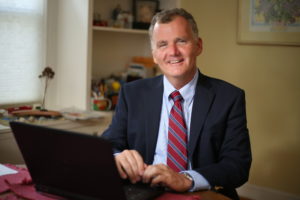
Experiential Matters: Building Trust Online
Trust forms the basis for human growth, as many learned from Erik Erikson’s psychological stage theory. Infants need consistent, predictable, and reliable connection and responses from caregivers for healthy development. These qualities facilitate an environment that allows for the emergence of inner confidence and strong emotional bonds with others. While we are born with the capacity for trust, we learn to trust through lived experience over time.
A piece of theory from D.W. Winnicott, British child psychiatrist, liberates caregivers and teachers alike from the burden of getting everything just right. Winnicott offers a supportive message to the tired and weary: you don’t need to be perfect. “Good-enough” is just fine. Reliable caregivers put supportive provisions in place, and they create space for others to discover and learn on their own. Caregivers and teachers stand close by and ready to respond.
During the COVID pandemic, I have taught primarily in two modes: completely asynchronous courses using Blackboard learning modules, and blended courses using synchronous Zoom sessions and Blackboard modules. It has taken time to develop the skills to teach online. Thankfully the learning curve began well before the urgency of this time. When I think about “good enough” teaching, I need to check my own inclinations toward perfection, the need to: formulate precise learning objectives, create crisp podcasts and videos, and develop clear PowerPoint slides, among others. Certainly, these aspects of teaching matter. Participants need to be introduced to theory and practices and have their competence assessed.
Yet, trust as an embodied capacity of being tuned in and responsive to course participants has always been an aspect of effective teaching and learning in some fields and for some faculty. Since the onset of the pandemic, such practice has taken on new significance. Course material opens participants to others’ pain as well as their own. I have observed body language and read reflections that reveal genuine struggle, trauma, and wrestling. I empathically respond to participants. I exercise caution not to coerce sharing of information or details that would leave the participant feeling exposed or overly vulnerable. Noticing the gesture or the comment is often sufficient. Embodying trust in the online/virtual environment is not about catching every nuance. But it is about practicing good enough teaching that tunes in and follows through on body language and verbal and written comments.
Teaching online during the pandemic requires instructors to model trust for course participants. In a therapeutic relationship, a counselor creates an emotional and physical environment for care seekers to express themselves without fear of judgment. We certainly expect such trust to be demonstrated by a trained clinician. Instructors foster trust by taking seriously participants’ experience as they encounter course material. Fortunately, course instructors in their modeling of trust give permission for others in the class to offer their own supportive comments.
Trustworthy instructors do not gloss over glaring statements that beckon for attention. In a class I taught recently, a student introduced herself by saying that she was a bit apprehensive about how the class would unfold: “I am afraid of what it may break open in me.” I acknowledged the comment made in a video post and encouraged the participant to offer herself compassion. In the relative privacy of a course paper, the student referenced ongoing challenges in an intimate relationship. I responded to the statement with a brief, nonjudgmental, and supportive comment of my own. In so doing, I offered care for the student as a person even though it is not my role to elicit the further sharing of details. Paying attention and responding builds relationship and helps foster inner strength for participants in these trying times.
Both online Blackboard discussions and Zoom seminar sessions have created the space for a level of intimacy that I would rarely expect in the physical classroom. Intimacy has to do with the quality of participants’ sharing: an authentic encounter with course material and their own experience that reflects deep rather than superficial connections. Such deep dives occur through discussion board posts, journal reflections, presentations, course papers, summary exercises, and academic advising appointments. Holistic and trust-filled teaching and learning requires attentive instructors who listen, observe, and respond. Academic deans and other personnel can also exercise administrative leadership by recognizing the importance and value of such formative practices in theological education. Limiting the number of participants in online classes allows for tailored instructor engagement with participants, arguably the heart of trust-filled teaching and learning.
Leave a Reply